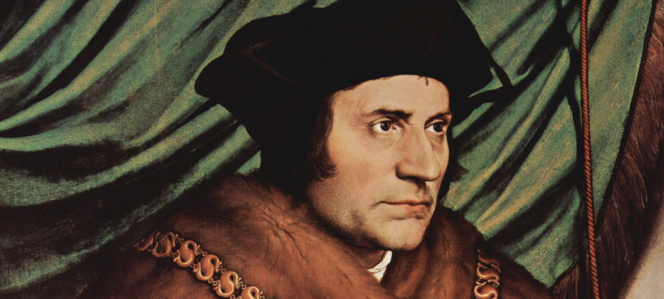Thanks to the 1966 film, A Man for All Seasons, which won Oscars for Best Picture and Best Actor, millions of people have witnessed the remarkable courage of St. Thomas More. With his feast day today, I’d like to focus on three lessons from his life about rights and responsibilities, core themes of Catholic social teaching.
First, Thomas reminds us that we’re all responsible for upholding the rights of others. When it comes to rights and duties, today’s world usually gets one side of the equation right. We strongly emphasize our own rights, demanding the right to do what we want, say what he want, and live where we want. And none of this is inherently bad, for to an extent, Catholic social teaching would agree. The Church maintains a long list of basic rights that all people deserve to claim—food, housing, healthcare, work, etc. Yet along with those rights we have corresponding responsibilities. These duties root themselves in our common brotherhood, the fact that we’re all created by the same God and are members of the same eternal family. Thus we’re responsible for helping each other flourish.
Thomas knew this well and it explains why he consistently submitted his own wants to the needs of others: to the material needs of the poor, to the legal needs of the oppressed, and to the demands of truth and conscience. For every right we have, we have the duty to protect that right in others.
Second, Thomas shows that accepting these duties often leads to discomfort. Thomas was no fool. He knew that by refusing to take King Henry’s oath, and honoring his Act of Succession, he would likely face trouble. He sensed that family and friends would not understand, and that standing for the truth would cost his job, his home, and probably his life. But he also knew it was the right thing to do. He prayed near the end of his life:
“Give me, good Lord, a longing to be with you: not for the avoiding of the calamities of this wicked world, nor of the pains of hell.”
When Thomas was eventually sentenced to death, as expected, he was prepared due to a lifetime of small sacrifices. He regularly ate leftover scraps, giving his best food away to the poor. On many nights he slept on the floor, with a log for his pillow. These small acts of intentional discomfort trained him for the greater discomfort he suffered later on—imprisonment, isolation, and execution. We too can train ourselves so that when duty requires uncomfortable choices, we’re ready to embrace them with heroic virtue.
Third, Thomas demonstrates that standing up for what is right doesn’t have to be gloomy. Throughout his life, he responded to his many difficulties with smiles and warmth. At his execution, the ever-cheerful Thomas calmed his executioner with some wisecracks: “Cheer up, man, and don’t mind doing your job. My neck is very short, so see you aim straight. You don’t want to spoil your reputation!” When the executioner lifted up his axe, ready for the final blow, Thomas cried: “Stop! I must put my beard aside. It would be a shame to chop it off. After all, my poor beard is not accused of treason.”
Thomas answered St. Teresa of Avila’s plea: “God protect me from gloomy faced saints.” Our attitude often drives our ability to respond well to difficulties. If we’re constantly cynical, or complain about every small hardship we suffer, we’ll never develop the moral fiber needed to stand against truly formidable opposition. Thomas knew that laughing and joking diffused the darkness his trials threatened to bring, and it brightened the lives of people around him.
St. Thomas More is certainly a “man for all seasons” and especially today, when religious liberty is threatened and Christians around the world face persecution. May we follow his lead by upholding the rights of others, embracing small sacrifices, and suffer our difficulties without gloom.
Adapted from Saints and Social Justice: A Guide to Changing the World by Brandon Vogt.
